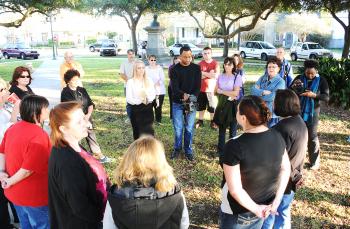
The news media and some residents gathered to make their case about a high school student who objected to prayer at an assembly at Morgan City High School. The residents gathered at Lawrence Park in Morgan City Thursday.
(The Daily Review Photo by Crystal Thieleipape)
ACLU: School prayer complaints rare
The American Civil Liberties Union in Louisiana has received an average of one complaint a month in the last year concerning prayer in school, but has never received a complaint about a student not being allowed to pray in school, according to the group’s executive director.
Margie Esman, the ACLU executive director in Louisiana, said her group does not have first-hand knowledge of the specific case of the Veterans Day celebration at Morgan City High School, nor is it involved with the case.
“I don’t think that we’ve ever had a complaint that students can’t pray. We would certainly be interested in something like that. We’ve never had one,” Esman said.
The complaints the ACLU receives involve prayers at assemblies and graduations, a person of a minority religion being told to adhere to Christianity, prayer before football games and prayer over the intercom in Jesus’ name.
“The number of complaints we receive is not really a reflection of what’s going on out in the world … This is just what people tell us. There is a lot that people don’t tell us either because they don’t know that they can or because, in many cases, people are afraid to speak out,” Esman said.
She said if prayer is student-led and the administration has no prior knowledge of it, then it’s permissible.
“But as soon as the administration gets involved, if they, for instance, choose a student to lead the prayer or if they say there’s going to be set aside time for a student-led prayer, that kind of thing, then that violates the law because it’s a matter of then the administration is sanctioning it as opposed to a student just doing it,” Esman said.
The legal question in Morgan City regarding the prayer, she said, “would be whether the school knew or reasonably expected that’s what (the minister) would do and if the school had any reason to believe he would do that and perhaps had invited him specifically because he was a minister, then yes, the school would be in violation of the First Amendment by having done that,” Esman said.
“If they had no idea that he was going to do this and he just went off on his own and led a prayer without anybody’s prior knowledge, then the school would have had an obligation to try and shut him down. If they didn’t do that and allowed it to continue then they basically were complicit,” she added.
Esman said the greatest misconception regarding prayer in public school is that the prohibition against forcing your prayer on others is the same as a prohibition on allowing you to pray.
“The fact is that anybody has the right to pray in school, or in any public place. What they don’t have the right to do is to force it on others … That’s a common misconception. Nobody is telling any student that they can’t pray in school. Nobody would tell any teacher that they can’t pray in school. What they are prohibited from doing is imposing that on other people,” Esman said.
- Log in to post comments
